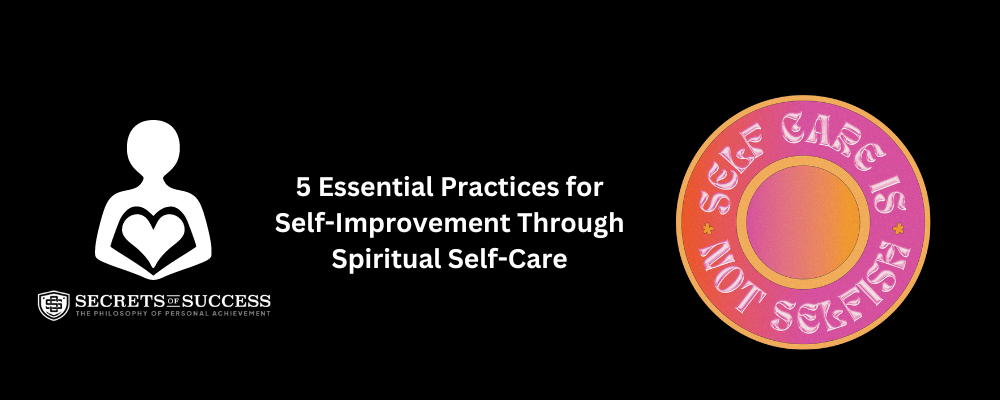In the hustle and bustle of everyday life, it’s easy to lose sight of our inner selves. Yet, nurturing your spiritual well-being is a cornerstone for personal growth and self-improvement. By cultivating a spiritual practice, you can create a more fulfilling life and strengthen your emotional resilience. This article explores five essential practices for self-improvement through spiritual self-care, guiding you on a path to a deeper, more meaningful life.
Check Out Secrets of Success for more Self Help Information
Understanding Spiritual Self-Care
What is Spiritual Self-Care?
Spiritual self-care involves practices that help you connect with your inner self, align with your values, and find meaning in life. It’s about nurturing your soul, seeking inner peace, and building a connection with something greater than yourself.
The Importance of Spiritual Self-Care
Incorporating spiritual self-care into your life can lead to profound personal growth. It helps you cultivate a sense of purpose, enhances your emotional well-being, and provides you with tools to navigate life’s challenges with grace and resilience.
Practice 1: Meditation and Mindfulness
Embracing Meditation for Inner Peace
Meditation is a powerful tool for spiritual self-care. It allows you to quiet the mind, focus inward, and connect with your inner self. Through regular meditation, you can reduce stress, enhance your emotional health, and foster a deeper sense of inner peace.
The Role of Mindfulness in Daily Life
Mindfulness involves being fully present in the moment, aware of your thoughts and feelings without judgment. By practicing mindfulness, you can develop a greater awareness of your spiritual needs and cultivate a more centered and peaceful life.
Practical Tips for Starting a Meditation Practice
- Start with just 5-10 minutes a day.
- Find a quiet space where you won’t be disturbed.
- Focus on your breath and gently return your attention whenever it wanders.
Practice 2: Connecting with Nature
The Healing Power of Nature
Nature has a unique way of grounding us and connecting us with the world around us. Whether it’s a walk in the park, hiking in the mountains, or simply sitting by a river, spending time in nature can be a profound spiritual experience.
Nature as a Reflection of Inner Self
Nature reflects the cycles of life, growth, and renewal, mirroring our own spiritual journey. By immersing yourself in nature, you can find inspiration, clarity, and a deeper connection to your inner self.
Ways to Incorporate Nature into Your Spiritual Practice
- Take regular walks in natural settings.
- Practice mindful breathing while observing the beauty around you.
- Create a nature journal to reflect on your experiences and insights.
Practice 3: Journaling for Self-Reflection
The Power of Written Expression
Journaling is a powerful practice for self-reflection and spiritual growth. Writing down your thoughts, feelings, and experiences can help you process emotions, gain insights, and track your spiritual journey.
Using Journaling as a Spiritual Tool
Through journaling, you can explore your inner world, clarify your values, and set intentions for personal growth. It’s a safe space to express your deepest thoughts and connect with your spiritual self.
Tips for Starting a Spiritual Journal
- Dedicate time each day to write, even if it’s just for a few minutes.
- Use prompts like “What am I grateful for today?” or “What did I learn about myself this week?”
- Reflect on your spiritual practices and how they are impacting your life.
Practice 4: Practicing Gratitude
Cultivating a Grateful Heart
Gratitude is a cornerstone of spiritual well-being. By focusing on what you’re grateful for, you can shift your mindset from scarcity to abundance, fostering a more positive and fulfilling life.
The Spiritual Benefits of Gratitude
Practicing gratitude regularly can increase your happiness, improve your relationships, and enhance your overall well-being. It helps you appreciate the small moments of life and cultivates a deeper sense of contentment.
Ways to Practice Gratitude Daily
- Keep a gratitude journal and write down three things you’re thankful for each day.
- Express your appreciation to others regularly.
- Reflect on the positive aspects of your life during meditation or prayer.
Practice 5: Engaging in Spiritual Reading and Study
Nourishing the Soul Through Spiritual Literature
Reading spiritual books and texts can provide you with wisdom, inspiration, and guidance on your spiritual journey. Whether it’s religious scriptures, philosophical works, or self-help books, spiritual reading can deepen your understanding and connection to your inner self.
The Importance of Continuous Learning
Engaging in spiritual study is a lifelong process. It helps you expand your knowledge, challenge your beliefs, and grow in your spiritual practice. Continuous learning keeps your spiritual journey dynamic and ever-evolving.
Selecting the Right Spiritual Literature
- Choose books that resonate with your beliefs and values.
- Explore different perspectives to broaden your understanding.
- Reflect on how the teachings apply to your life and spiritual growth.
Integrating Spiritual Practices into Daily Life
Creating a Spiritual Routine
To truly benefit from spiritual self-care, it’s important to make it a regular part of your life. By integrating these practices into your daily routine, you can create a strong foundation for personal growth and well-being.
Balancing Spiritual Practice with Daily Responsibilities
While spiritual practices are essential, balancing them with your daily responsibilities is crucial. Start small and gradually incorporate these practices into your life in a way that feels natural and sustainable.
Tips for Maintaining a Spiritual Routine
- Set aside specific times each day for your spiritual practices.
- Be patient with yourself and allow flexibility in your routine.
- Reflect regularly on your progress and adjust your practices as needed.
Conclusion
Spiritual self-care is a powerful tool for self-improvement. By incorporating practices like meditation, connecting with nature, journaling, practicing gratitude, and engaging in spiritual reading, you can nurture your inner self and embark on a journey of personal growth. These practices help you connect with your true self, find meaning in life, and cultivate a deeper sense of inner peace and fulfillment.
FAQs
What is the best time to practice meditation?
The best time to practice meditation is when you can be consistent. Many people find mornings to be an ideal time, as it sets a positive tone for the day. However, the most important thing is to choose a time that fits your schedule.
How can I start a spiritual journal if I’m not a writer?
You don’t need to be a writer to start a spiritual journal. Begin with simple prompts or reflections, and remember that your journal is a personal space for your thoughts and feelings. The key is consistency, not perfection.
Can gratitude practice really change my life?
Yes, practicing gratitude can have a profound impact on your life. It shifts your focus from what’s lacking to what’s abundant, improving your mood, relationships, and overall well-being.
How do I choose spiritual books that resonate with me?
Start by exploring books that align with your beliefs or those that pique your curiosity. Don’t hesitate to explore different genres and perspectives, and choose what speaks to you personally.
How can I maintain a spiritual routine with a busy schedule?
Start with small, manageable practices that fit into your daily life. Whether it’s a few minutes of meditation, a short walk in nature, or a quick journal entry, consistency is key. Over time, these practices will become a natural part of your routine.
Self-Esteem Fundamentals: Facts to Help You Build Confidence




